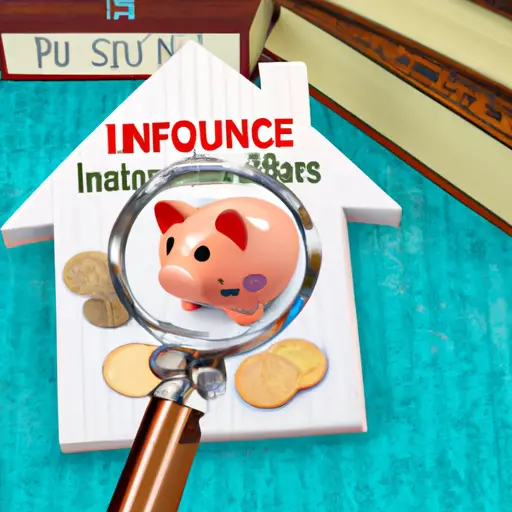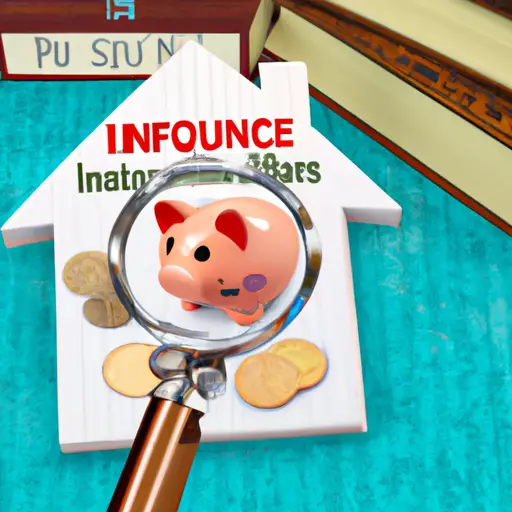Do you ever feel like your home insurance costs are eating away at your budget? I know I do! It’s frustrating when you’re trying to live a frugal lifestyle and save money, but your insurance bills keep piling up. That’s why I wanted to share some tips on how to save money on home insurance. In this article, we’ll explore different ways you can lower your insurance costs and keep more money in your pocket. So, let’s dive in and see how we can start saving!
One of the first things you can do to save money on home insurance is to shop around for different quotes. Many people make the mistake of sticking with the same insurance provider year after year, even if there are better deals out there. Take the time to compare quotes from different companies and see if you can find a better rate. You might be surprised at how much money you can save just by switching providers!
Another way to save money on home insurance is by increasing your deductible. This is the amount of money you’ll have to pay out of pocket before your insurance coverage kicks in. By opting for a higher deductible, you can lower your monthly premium. Just make sure you have enough money set aside to cover the deductible in case of an emergency. Otherwise, you could end up in a difficult financial situation.
Lastly, consider bundling your home insurance with other types of insurance, such as car insurance. Many insurance companies offer discounts if you have multiple policies with them. So, if you’re already paying for car insurance, why not see if you can save some money by bundling it with your home insurance? It’s definitely worth looking into, and it can help you save some extra cash each month. Stay tuned for more tips on how to save money on home insurance in the next article!
Understanding Home Insurance
What is home insurance?
Home insurance is a type of insurance policy designed to protect your home and its contents from potential risks and damages. It provides financial coverage in case of theft, fire, natural disasters, and other unforeseen circumstances that may cause damage or loss to your property.
Why is home insurance important?
Home insurance is important because it offers financial protection and peace of mind. It safeguards your biggest investment – your home – and ensures that you won’t have to bear the burden of repair or replacement costs in the event of a covered loss. Without home insurance, you would have to bear these costs out of your own pocket, which can be financially disastrous.
Types of home insurance coverage
There are several types of home insurance coverage:
-
Dwelling coverage: This covers the structure of your home, including its foundation, walls, roof, and other attached structures like garages and sheds.
-
Personal property coverage: This covers the belongings inside your home, such as furniture, appliances, clothing, and electronics. It typically has a limit and may have exclusions for certain high-value items like jewelry or artwork.
-
Liability coverage: This protects you in case someone gets injured on your property and decides to file a lawsuit against you. It covers both legal fees and the damages awarded if you’re found responsible.
-
Additional living expenses coverage: Also known as loss of use coverage, this provides financial assistance for temporary living expenses if your home becomes uninhabitable due to a covered loss.
-
Medical payments coverage: This covers medical expenses for anyone who gets injured on your property, regardless of whether you’re liable for the injury.
-
Other structures coverage: This covers structures that are not attached to your main dwelling, such as fences, tool sheds, or detached garages.
Factors That Affect Home Insurance Cost
Several factors can influence the cost of your home insurance premiums. Understanding these factors can help you make informed decisions and potentially save money on your policy.
Location of the property
The location of your property plays a significant role in determining your home insurance cost. Insurance companies consider the risk associated with your location, including the likelihood of natural disasters like floods, earthquakes, or hurricanes. If your property is in an area prone to such risks, your premiums may be higher.
Age and condition of the property
Older homes may be more expensive to insure as they tend to have outdated electrical systems, plumbing, and structural issues that can increase the risk of damage. Similarly, properties in poor condition or in need of repairs can also result in higher premiums. On the other hand, well-maintained homes with modern fixtures and security features may qualify for lower rates.
Claims history
Your claims history can impact your home insurance premiums. If you have a history of filing multiple claims, it may raise red flags for insurance companies and lead to higher premiums. Insurers view homeowners with frequent claims as higher risks. Therefore, it’s important to evaluate whether a claim is necessary before filing.
Home security measures
Installing security features in your home, such as an alarm system, smoke detectors, deadbolt locks, or a security camera system, can lower your insurance costs. These measures reduce the risk of theft, fire, or other incidents, and insurance companies may offer discounts for taking such precautions.
Credit score
While it may seem unrelated, your credit score can impact your home insurance premiums. Insurance companies consider your credit score as an indicator of your financial responsibility. A lower credit score may imply a higher risk of late or missed payments, leading to higher premiums. It’s important to regularly monitor and improve your credit score to potentially save money on insurance premiums.

Tips to Save Money on Home Insurance Premiums
Now that we understand the factors that affect home insurance costs, let’s explore some practical ways to save money on your home insurance premiums:
Shop around for the best rates
Don’t settle for the first home insurance policy you come across. Take the time to research and compare quotes from multiple insurance providers. Prices can vary significantly, so it’s important to shop around and find the best coverage at the most affordable rate. Consider reaching out to independent insurance agents who can provide quotes from different companies.
Bundle home and auto insurance
Many insurance companies offer discounts if you bundle multiple policies, such as home and auto insurance, with the same provider. This can lead to significant savings on both policies. Bundling also simplifies your insurance management, as you only have to deal with one insurer for multiple coverage needs.
Raise your deductible
The deductible is the amount you pay out of pocket before your insurance coverage kicks in. By choosing a higher deductible, you can reduce your home insurance premiums. However, keep in mind that you’ll need to have the financial means to cover the deductible in case of a claim.
Improve home security
Investing in security measures for your home not only provides peace of mind but can also result in lower insurance premiums. Install an alarm system, smoke detectors, deadbolt locks, and security cameras, as they can make your home less susceptible to theft, fire, or other damages.
Maintain a good credit score
As mentioned earlier, a good credit score can lead to lower home insurance premiums. Pay your bills on time, keep credit card balances low, and regularly monitor your credit report for any inaccuracies or issues. Improving your credit score can result in long-term savings on insurance costs.
Discounts and Savings Strategies
In addition to the tips mentioned above, many insurance providers offer various discounts and savings strategies to help homeowners save money on their home insurance premiums. Here are some common discounts to look out for:
Multi-policy discount
Insurance companies often offer discounts if you have multiple policies with them. This can include bundling your home and auto insurance or even adding other types of insurance, such as life or umbrella policies. Combining policies with the same insurer can lead to discounted rates.
Claims-free discount
By maintaining a claims-free history for a certain period, typically three to five years, you may be eligible for a claims-free discount. Insurance companies reward homeowners who do not make claims by offering reduced premiums.
Home security system discount
Installing a professionally monitored home security system can not only provide peace of mind but also help you qualify for a discount on your home insurance premiums. Be sure to check with your insurer to see if they offer such discounts and what types of security systems may be eligible.
Renovation discount
If you’ve recently renovated your home and made specific improvements, such as updating plumbing or electrical systems, replacing the roof, or installing impact-resistant windows, you may qualify for a renovation discount. These upgrades can reduce the risk of damage, leading to potential savings on your insurance premiums.
Discount for loyalty to insurer
Some insurance companies reward loyalty by offering discounts to long-term policyholders. If you’ve been insured with the same company for a significant period, inquire about loyalty discounts and whether they apply to your policy.

Saving Techniques for Homeowners
As a homeowner, there are additional cost-saving techniques you can implement to reduce your home insurance premiums:
Regularly review your coverage
Periodically review your home insurance policy to ensure it adequately covers your needs without unnecessary extras. As your home and circumstances change over time, so do your insurance requirements. Updating your policy accordingly can help avoid overpaying or being underinsured.
Make renovations or improvements
Consider making renovations or improvements to your home that can lead to insurance premium reductions. For example, upgrading your roof to a more resistant material or installing a home sprinkler system can lower your insurance costs. Consult with your insurance provider to determine which renovations qualify for discounts.
Update your insurance policy
Keep your insurance provider informed about any changes to your property, such as installing a swimming pool or adding an extension. Failing to disclose such changes may result in coverage gaps or potential claim denials. Review and update your policy whenever you make significant changes to your property.
Consider increasing liability coverage
Liability coverage protects you in case someone gets injured on your property and sues you for damages. Consider increasing your liability coverage beyond the minimum requirement for additional protection, as this can be cost-effective in the long run.
Get rid of unnecessary coverage
Re-evaluate your policy to identify any unnecessary coverage options. For example, if you no longer own valuable jewelry or no longer have specific risks (such as having a swimming pool), removing these coverage options from your policy can help reduce your premiums.
Claims Process and Documentation
Understanding the claims process
In the unfortunate event of a covered loss, understanding the claims process can help streamline the process and ensure a smooth experience. Contact your insurance company to report the claim as soon as possible. Provide all necessary information and documentation to support your claim.
Documenting the damage
Take photos or videos of the damage, documenting the extent of the loss. This visual evidence will strengthen your claim and help the insurance adjuster assess the damages accurately. Keep an inventory of your personal belongings and any receipts or proof of purchase, as this can also assist in the claims process.
Filing a claim
Follow your insurance company’s guidelines for filing a claim. Be prepared to provide details about the incident, including the date, time, and cause of the loss. Your insurance company will guide you through the necessary paperwork and documentation required to process your claim.
Working with the insurance adjuster
An insurance adjuster will assess the damage and determine the amount of compensation you’re eligible for. Cooperate fully and provide any additional information or documentation requested. If you disagree with the adjuster’s assessment, provide evidence to support your position and communicate your concerns with your insurance company.

Factors to Consider When Choosing an Insurance Provider
When choosing an insurance provider, it’s essential to consider various factors beyond just the cost of premiums. Here are some factors to keep in mind:
Financial strength and stability
Choose an insurance company with a strong financial rating. This ensures that the company has the financial resources to fulfill its obligations in the event of a claim. Research the company’s ratings from independent rating agencies such as A.M. Best, Standard & Poor’s, or Moody’s.
Customer service and support
Good customer service is crucial when it comes to insurance. Consider the insurer’s reputation for customer service, responsiveness, and ease of communication. Read reviews from customers to get a sense of their experiences with the company’s claims handling and overall customer satisfaction.
Coverage options and limits
Review the coverage options and limits offered by different insurance providers. Ensure that the policy covers your specific needs and that the coverage limits are sufficient to protect your property and belongings adequately.
Claims handling process
Look for an insurance company with a straightforward and efficient claims handling process. Research their average claim processing time and their reputation for handling claims fairly and promptly. A smooth and efficient claims process can save you time, stress, and money in the long run.
Online tools and resources
Insurance providers that offer online tools and resources can enhance your overall experience. Look for companies that provide convenient online platforms for managing your policy, accessing important documents, and making payments. Online tools and resources can make managing your insurance policy more convenient and accessible.
Common Home Insurance Mistakes to Avoid
To ensure that you’re getting the most out of your home insurance policy, it’s important to avoid common mistakes that may leave you underinsured or paying more than necessary. Here are some mistakes to avoid:
Underinsuring your property
Underinsuring your property to save on premiums can have significant financial consequences in the event of a covered loss. The cost to rebuild or repair your home may be higher than the insured value, leaving you responsible for the difference. Ensure that your policy covers the full replacement cost of your home and its contents.
Failing to update your policy
Failure to update your policy with significant changes to your home can result in coverage gaps. If you’ve made renovations, additions, or improvements to your property, inform your insurance provider to ensure that your policy reflects the current value and condition of your home.
Not understanding the coverage
Read your policy thoroughly to understand the coverage, exclusions, and limitations. Failure to understand your coverage can lead to surprises when filing a claim. Contact your insurance provider if you have any questions or need clarification on any aspect of your policy.
Not reviewing policy annually
Your insurance needs can change over time, and failing to review your policy annually can result in inadequate coverage. Annually review your policy to ensure it still meets your needs and to make any necessary adjustments or updates.
Choosing the cheapest option without considering coverage
While affordability is important, solely focusing on finding the cheapest insurance policy without considering the coverage and quality of the insurance company can be a costly mistake. Ensure that the policy offers the necessary coverage and that the insurance provider has a good reputation for customer service and claims handling.

Additional Coverage Options
In addition to standard home insurance coverages, there are several additional coverage options you may want to consider:
Flood insurance
Standard home insurance policies typically do not cover damage caused by flooding. If you live in a flood-prone area, consider purchasing separate flood insurance to protect your property from flood-related damages.
Earthquake insurance
Similarly, earthquake damage is typically not covered under standard home insurance policies. If you live in an earthquake-prone region, consider purchasing earthquake insurance to safeguard your property against earthquake-related damages.
Sewer and water backup coverage
Issues with your sewer system or water backup can cause significant damage to your home and belongings. Sewer and water backup coverage can help cover the cost of repairs or replacements resulting from such incidents.
Identity theft protection
Identity theft is a growing concern in today’s digital world. Identity theft protection coverage can provide reimbursement for expenses related to recovering your identity, such as legal fees, credit monitoring, and lost wages.
Understanding Policy Exclusions and Limitations
It’s important to be aware of certain exclusions and limitations in your home insurance policy to understand the extent of your coverage. Here are some common policy exclusions and limitations:
Exclusions for certain types of damage
Certain types of damage, such as intentional acts, war or terrorism, or normal wear and tear, are typically excluded from coverage under standard home insurance policies. Review your policy to understand what types of damage are excluded.
Coverage limits for high-value items
Standard home insurance policies often have coverage limits for high-value items, such as jewelry, artwork, or collectibles. If you own such items, consider getting additional coverage or scheduling them separately to ensure they are adequately protected.
Loss of use limitations
If your home becomes uninhabitable due to a covered loss, additional living expenses coverage can help with temporary living arrangements. However, there may be limitations on the amount of coverage or the duration for which it applies. Review your policy to understand the limitations and coverage amounts provided.
Coverage for natural disasters
While some natural disasters such as fires or lightning strikes are typically covered under standard home insurance policies, others, like earthquakes or floods, may require separate policies. Review your policy to understand which natural disasters are covered and consider purchasing additional coverage if needed.

Tips for Making Your Home Insurance Claims Easier
In the event of a covered loss, these tips can help make the claims process smoother and more efficient:
Create a home inventory
Maintain an up-to-date home inventory that includes a list of your belongings, their values, and any supporting documentation such as receipts or photographs. This inventory will help ensure accurate reimbursement and streamline the claims process.
Keep important documents safe
Store copies of your insurance policy, inventory, and other important documents in a safe, easily accessible location. Consider keeping digital copies as backups or saving them in secure online storage.
Take photos or videos of your property
Before any damage occurs, take comprehensive photos or videos of your property and belongings. These visual records can provide valuable evidence in the event of a claim and help the insurance adjuster assess the extent of the damage.
Report losses promptly
Contact your insurance company as soon as possible to report any losses or damages. Insurance policies often have specific time frames within which you must report a claim. Failing to report promptly can lead to claim denials or delays.
Keep records of repairs and expenses
Keep detailed documentation of any repairs or expenses related to the covered loss. This includes invoices, receipts, and any communication with contractors or service providers. These records will help support your claim and ensure accurate reimbursement.
How to Lower Your Home Insurance Costs in the Long Run
While immediate cost-saving techniques can help reduce your home insurance premiums, here are some strategies to lower your costs in the long run:
Maintain a good claims history
Avoid making unnecessary claims and maintain a claims-free history as much as possible. Insurance companies view homeowners with a history of frequent claims as higher risks, which can lead to higher premiums. Assess the severity of a loss before filing a claim and consider if it’s financially beneficial to do so.
Regularly update home security measures
As technology advances, new home security systems and features become available. Regularly evaluate and update your security measures to take advantage of any advancements. Notify your insurance provider if you make significant security enhancements, as this may result in lower premiums.
Review and adjust coverage as needed
Periodically review your coverage limits and deductibles to ensure that they still meet your needs. As your circumstances change, such as paying off your mortgage or acquiring valuable possessions, it may be beneficial to adjust your coverage accordingly.
Consider increasing your deductible
Opting for a higher deductible can significantly reduce your home insurance premiums. However, ensure that you have sufficient funds to cover the deductible in the event of a claim. Evaluate your financial situation and make a decision based on your comfort level and ability to handle unexpected costs.
Explore other insurance providers
Regularly compare quotes from different insurance providers to ensure you’re getting the best possible rate for your coverage needs. Insurance rates can vary significantly between companies, so don’t hesitate to explore other options and switch providers if it makes financial sense.
Understanding Home Insurance Jargon
To fully grasp your home insurance policy and navigate the insurance landscape, it’s helpful to familiarize yourself with some common insurance jargon:
Dwelling coverage
Dwelling coverage refers to the part of your home insurance policy that specifically covers the physical structure of your home, including the walls, roof, foundation, and attached structures like garages or sheds.
Personal property coverage
Personal property coverage refers to the part of your insurance policy that covers your personal belongings inside your home, such as furniture, clothing, appliances, and electronics. This coverage typically extends to both on and off-premises losses.
Liability coverage
Liability coverage protects you if someone gets injured on your property and decides to sue you for damages. It covers both the legal fees and any damages awarded if you’re found liable.
Actual cash value vs. replacement cost
When it comes to personal property coverage, insurance policies may offer either actual cash value (ACV) or replacement cost coverage. ACV coverage reimburses you for the value of your belongings at their current depreciated value, while replacement cost coverage provides the funds necessary to replace the items with new ones of similar quality.
Named perils vs. all-risk coverage
Named perils coverage specifies the specific perils or risks that are covered under the policy, such as fire, theft, or windstorm. In contrast, all-risk coverage (also known as open peril coverage) provides broader protection and covers all risks except for those explicitly excluded in the policy.
Conclusion
By implementing these money-saving strategies, homeowners can reduce the cost of their home insurance premiums while still maintaining adequate coverage to protect their property and belongings. Remember to regularly review your policy, explore discounts and savings strategies, and ensure that you have an adequate understanding of your coverage and policy terms. With a proactive approach and a little research, you can save money on home insurance without compromising on the protection and peace of mind it provides.

